#thomas malory
Text

Illustration from Thomas Malory's Le Morte D'Arthur by W. Russell Flint (1910)
#william russell flint#art#illustration#golden age of illustration#1910s#1910s art#vintage art#vintage illustration#vintage#scottish art#scottish artist#books#book illustration#le morte d'arthur#mythology#arthurian mythology#arthurian legend#thomas malory#classic art
781 notes
·
View notes
Text
Two simply beautiful turns of phrase from The Tale of King Arthur:


And one that made me choke because I accidentally read it as horrible memes:

(Maims, it's maims)
#defend us from death and horrible memes#arthuriana#medieval literature#thomas malory#the tale of king arthur
243 notes
·
View notes
Text
Google Docs vs. Thomas Malory
I'm working on the Malory chapter of my dissertation, and at one point Google Docs' spellcheck red-underlined a word but failed to provide a suggestion.

I thought it was odd that Google Docs was unable to spot the fact that I'd dropped an R, and then I recalled hearing recently that Google had started using a machine-learning-powered spellcheck that was, frankly, terrible.
Incidentally, clicking "Why am I not seeing a suggestion?" takes you to a section of their Support page that reads as follows:
Words where spelling is not recognized are underlined in red to warn you of a possible misspelling. When you click on the word, you'll see a "Spelling" label. If there is no spelling suggestion available, you can choose to edit the word, add the word to your personal dictionary, or ignore the suggestion.
Note that this does not answer the question, which to me implies that the real answer is "because it's crap". (Quick aside: I'm not one who is generally inclined to trust spellcheck anyway, as I am in my 30s and remember when "blindly taking spellcheck's suggestions" was something one would get mocked for, but I am annoyed that it's actively getting worse.)
So I decided to play with Google Docs a bit and see what it had to say about all the words it was underlining in the Malory quotations. (This may be a bit unfair, since "modernize 15th-century spelling" is not a function spellcheck is meant to have, but I also think that ruining a perfectly adequate spellcheck system with machine learning isn't fair to its users, so they started it.
Some of my favorite results below the cut.

Okay, that's also not a Modern English word. It's still Middle English, just a different variant spelling. Google Docs, you are out of your lane here.

This is not in the OED, and Googling it reveals that it's a surname. Weird guess here, Google Docs. At least capitalize it if you want me to lump Mx. DeVellis in with the fiends.

Buddy (derogatory), I don't think that one's correct either.

I thought this was just nonsense guessing, but apparently there's a company called "Bonwyke" that sells window films. You know, I'm somehow not surprised that the machine knows the names of corporations.
Google Docs failed to even come up with a suggestion for about half the words it underlined, which is fair, but the ones that stumped it include the following off-by-one-letter spellings:
calle ("call")
mayden ("maiden")
nyght ("night")
It's also continuing with this malarkey:

Google Docs, worstie -- you have got to learn what an abbreviation is. This isn't even an uncommon one. Why do they confuse you every time? If you're really using machine learning, surely you should eventually figure out that periods are used for purposes other than ending a sentence.
Anyway, I'm only three pages into writing this chapter, so I may well come back with more of these, but in the meantime allow me to leave you with a spelling suggestion that I just think is funny.

The Strongest Wayne. And Percival did what to him?
204 notes
·
View notes
Text
Galahad calling Lancelot "sir" before they went on a father-son monsterslaying boating trip, to calling Lancelot, "Fair sweet father" and then kissing his dad when he had to leave the ship make me so 🥺🥺🥺🥺🥺🥺🥺
That's character development, folks! 🥺😤🙌🏼
141 notes
·
View notes
Text
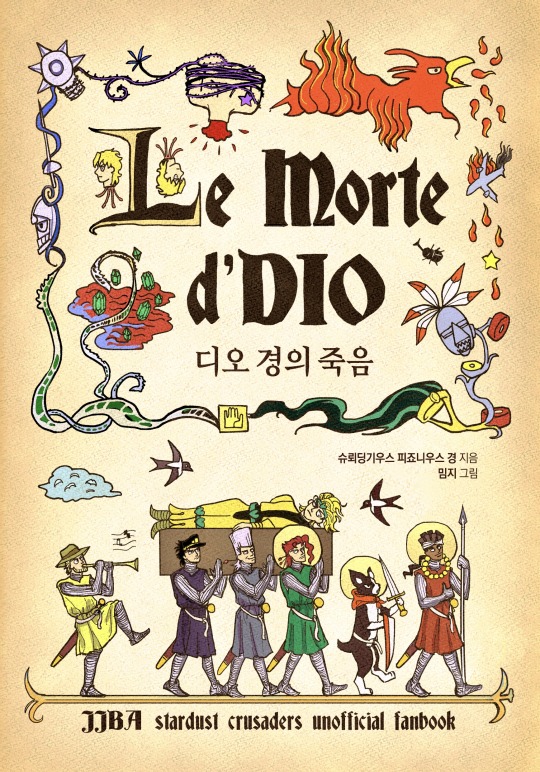
Book cover I did for my friend’s fanbook Le Morte d’DIO, which is a rewriting of Stardust Crusaders in the style of Le Morte d’Arthur by Sir Thomas Malory.
It is truly an amazing work.
#my art#jjba#jojo’s bizarre adventure#stardust crusaders#jotaro kujo#noriaki kakyoin#jean pierre polnareff#muhammad avdol#jojo iggy#jjba part 5#le morte d’arthur#thomas malory#arthuriana
231 notes
·
View notes
Text
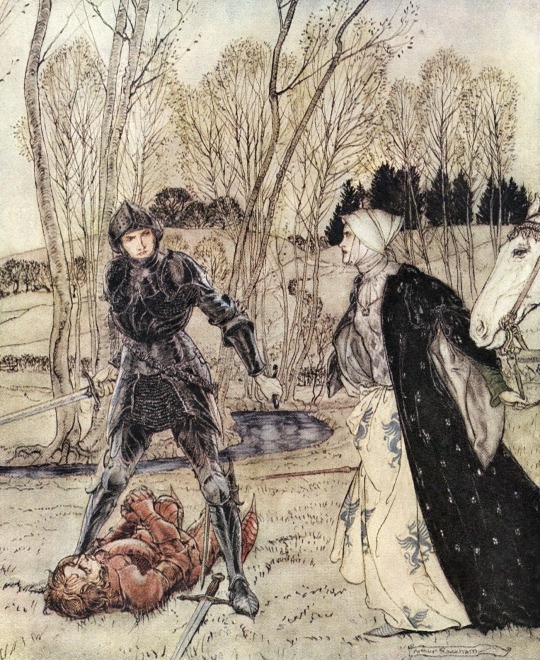
"How Beaumains defeated the Red Knight, and always the damosel spake many foul words unto him"
by Arthur Rackham
#arthur rackham#arthurian#art#beaumains#red knight#combat#duel#medieval#chivalry#knights#middle ages#le morte d'arthur#morte d'arthur#chivalric romance#sir thomas malory#thomas malory#knights of the round table#england#britain#mythology#history#armour#knight#knighthood#damsel#damsels#king arthur
477 notes
·
View notes
Text

Dynamic artwork from 100 years ago. I wonder if anyone has written an Escaflowne fanfic that involves jousting? Jousting with Guymelefs or the other exotic beast people ride on Gaea would be quite thrilling to behold.
Illustration from the book "The Boy's King Arthur", a retelling for young readers of Thomas Malory's Le Morte D' Arthur. Art by N. C. Wyeth , 1922.
#vision of escaflowne#escaflowne#tenkuu no escaflowne#knights#knightcore#medieval#mediaeval#medieval aesthetic#dark fantasy#historical art#traditional art#king arthur#knights of the round table#jousting#nc wyeth#20th century#book illustration#thomas malory#le morte d'arthur#medieval england
119 notes
·
View notes
Text
when you need a secret identity but creativity isn’t your forte:

[ID: a cropped picture of a page from Book 8 ('Sir Tristram de Lyonesse') of Thomas Malory's Le Morte Darthur. The highlighted line, spoken by Sir Tristram in disguise in Ireland, reads: 'my name is Tramtrist'. End ID.]
#HOWLING#this dumb bitch (affectionate)#please let it be that angwish and his queen are like 'huh tramtrist is a very similar name to tristam who murdered a close family member'#and tristam is just like yeah he's my evil twin we don't get on#don't worry though i'm not like him at all#if that happens i will LOSE MY SHIT#ah i'm having a blast#lit reads malory#arthuriana#sir tristram#sir tristan#thomas malory#le morte d'arthur
181 notes
·
View notes
Text


#the worst lay that ever harper sang with harp or with any other instruments oh malory read him to FILTH#poor guy#le morte d'arthur#thomas malory#arthuriana#arthurian literature#arthurian legend#sir dinadan#dinadan#would you believe that i created this from a mikey way rolls worst joint ever asked to leave my chemical romance meme#you can catch a sliver of a glimpse of mikey just under the left hand photo lmaoo#knights#knights of the round table#medieval literature
44 notes
·
View notes
Text
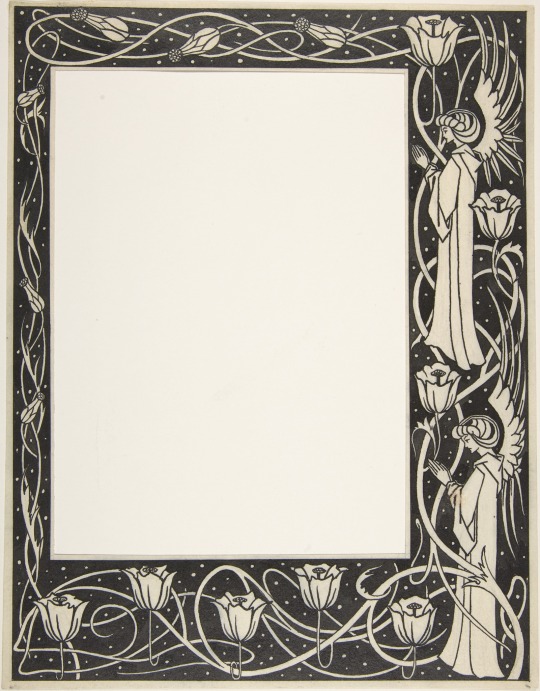
Aubrey Beardsley, ”Praying Angels and Poppies” (Border Design for Thomas Malory, "Le Morte d'Arthur," J. M. Dent 1893–94)
60 notes
·
View notes
Text
Reading the Vulgate Cycle and just. Y’all. Everyone. Why does anyone bother with Malory, this is so much better.
As an example. Malory’s Morte d’Arthur, the scene where Lancelot wears Kay’s armor and wreaks some havoc on the way back to Arthur’s court:

It’s so dry. SO DRY. How did he make that boring?
The same scene in the Vulgate Cycle, written 2.5 centuries earlier:
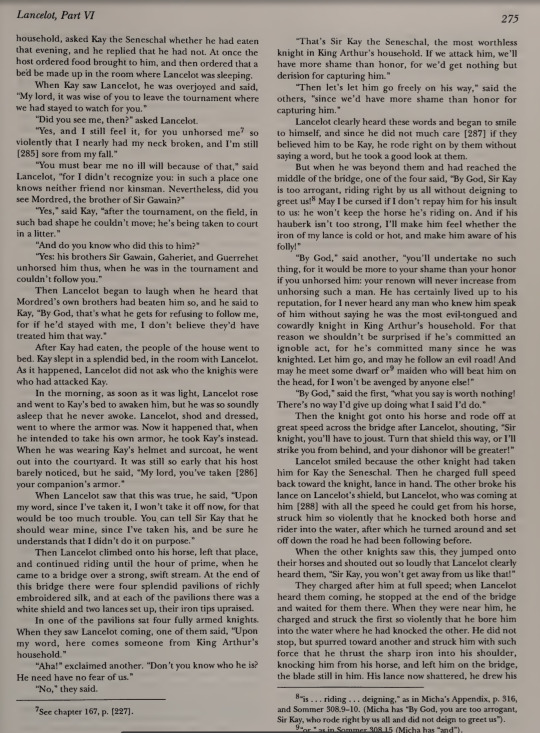
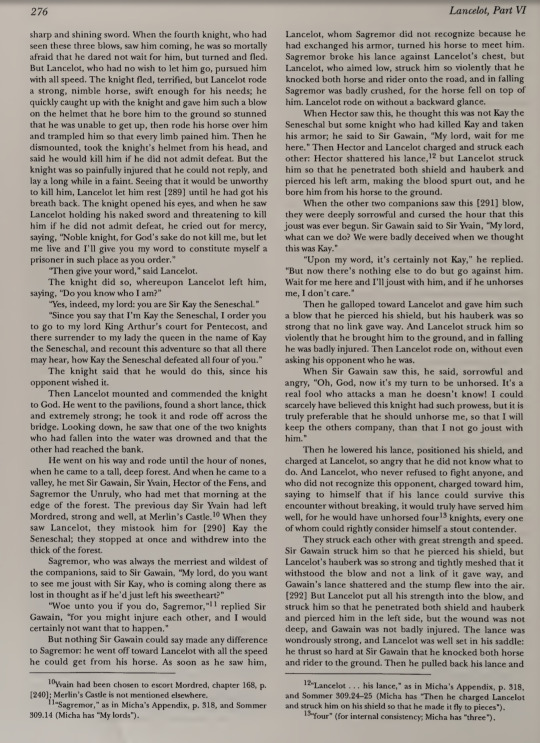
#le morte d’arthur#Thomas Malory#vulgate cycle#vulgate#Arthurian literature#arthuriana#lancelot grail
34 notes
·
View notes
Text
Resources for Malory Daily
12-day countdown before we start reading Le Morte D'Arthur together! Ahead of the read-a-long, I've put together a folder of resources that include the texts that will be used, including editions of both Caxton and Winchester versions.
General folder of resources.
Straight to the texts.
Additionally, I've broken down secondary literature by theme - if you happen to have suggestions for other reading or have a pdf you would like me to upload to the drive, let me know!
A non-exhaustive list of reading themes included:
Death
Disability
Gender and Sexuality
Space and Geography
Material Culture
Community and Context
Text and Malory
The Grail
War & Opposition
Politics
I expect to add more folders and pdfs to this collection as I continue the process of going through my university hard drive, so check back in for more. Let me know as well if for any reason one of the links is broken.
#malorydaily#arthuriana#arthurian literature#le morte d'arthur#medieval lit#resources#thomas malory#medieval literature#15th century
62 notes
·
View notes
Text
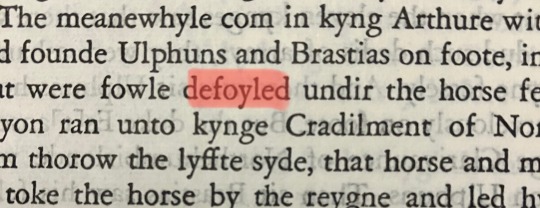
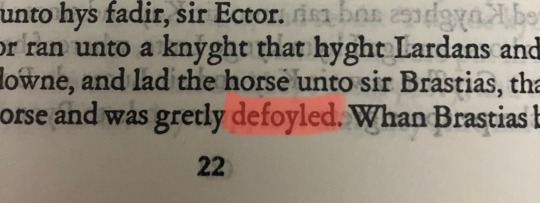
The word "defiled" being used specifically to describe knights trampled under the feet of horses in battle sent me down an etymological rabbithole. Apparently it comes from Medieval Latin fullare (to full), which stems in turn from fullo, an occupational word meaning "one who fulls".
Fulling is something I've experimented with quite a bit. It's the process of agitating wetted fabric, usually wool, in order to bind the fibres closer together, partially felting them and making the fabric heavier and thicker once it's dried. Scottish tartan material is fulled, and Vikings also fulled their outerwear to make it weather-repellent. When I was trying to recreate historical diapering methods with my daughter earlier this year, I made several fulled wool pilchers to help prevent leaks, which worked well.
Fullare seems to refer specifically to fulling fabric by stomping on it, a common method in ages past which draws quite an image for the poor fallen knights. Nowadays we tend to think of defiling as soiling or dirtying something rather than stomping on it; this is partly thanks to the influence of a similar-sounding Old English word, fulen ("to rot"), the ancestor of today's "foul".
I have to get my surgical staples out later today, which isn't fun, so I'm glad I've got some lovely new etymology to distract me.
#arthuriana#medieval literature#thomas malory#middle english#old english#latin#etymology#language#history#textile arts#when obsessions collide
123 notes
·
View notes
Text
The absolute BEST part of Le Morte d'Arthur is Thomas Malory's little authors notes sprinkled throughout.
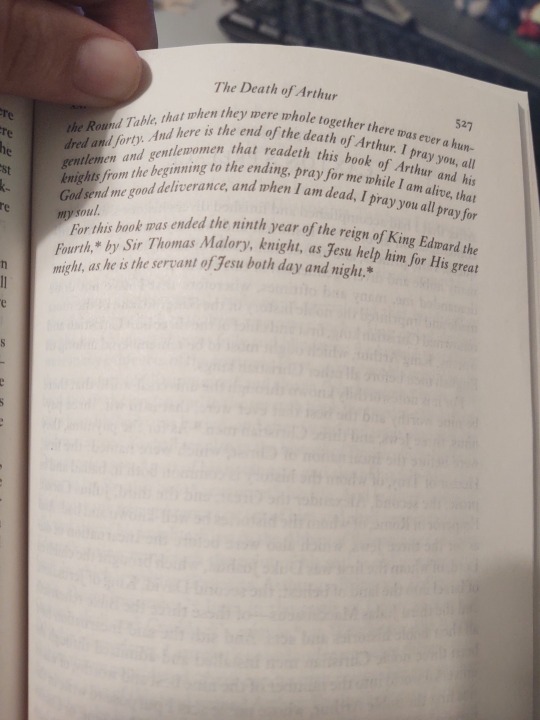




Mr. Malory wants us to know that A) He's a knight, and B) that he's writing this in prison and C) to send him thoughts and prayers. Much like the AO3 writers of our own time, this man did not let something as petty as incarceration get in the way of writing his fanfic.
#arthuriana#arthurian legend#arthurian mythos#king arthur#send my man thoughts and prayers he keeps asking for them#thomas malory#le morte d'arthur
54 notes
·
View notes
Text

Text reads (modernized by me):
“Sir, then will I do it,” said Sir Lancelot.
“Also, sir, I charge you that you eat no flesh as long as you be in the quest of the Holy Grail, neither shall you drink wine, and that you hear mass daily and you may do it.”
Saw this passage in Le Morte Darthur, where a hermit is having Lancelot take some vows, and it struck me as odd. This is a holy man helping Lancelot on a holy quest for a holy relic and he’s just barred him from taking communion. No wine, no communion. And you’d think that engaging in church rituals would be encouraged on a quest of this nature, not banned.
“Ah,” you might say, “but transubstantiation*! The wine isn’t wine!”
Okay, sure. But if the wine is really blood, it follows that the bread is really flesh. And he can’t have that either, so he still can’t take communion. It gets you coming and going.
I want to see this guy’s hermitting license.
*a word which autocorrect believes is supposed to be “tea substance”
48 notes
·
View notes
Note
Do you know of something like an idiot's guide to reading Le Morte D'Arthur? The range of editions is astounding and I'm not sure where to begin - I don't want a retelling like Peter Ackroyd's (though the cover is very pretty) or an abridgement (like the Oxford World Classic edition seems to be?). I also don't know if I should be looking for something with footnotes and commentaries - I'd opt for the Norton Critical Edition but I think it's in the original Middle English and I really don't feel up to parsing Middle-English right now.
Slightly flippantly, my guide would be this:
Buy tissues, or find a couple of hankies in your drawer.
Read Le Morte d'Arthur.
Also, before I got to the end of your ask, I was going to say: that's easy, the Norton Critical Edition, precisely because of its full apparatus. This is very late Middle English, so it's not like reading Chaucer (or Layamon, or the Pearl-poet... you get my drift.) I tend to think of Le Morte as being neither in Middle English, nor in Early Modern English, but a Secret Third Thing. That said, Norton doesn't modernize the spelling. Janet Cowen's edition for Penguin does; it doesn't take the Winchester MS into account, but the smoothed-out spelling might be helpful to you.
I'm really not sure how else to help you, because if you don't want to read (late) Middle English, you actually do want a retelling, and don't want to read Le Morte d'Arthur. And maybe that way of intermediate steps is the way you want to go. Good luck! and in all seriousness, don't forget the tissues.
65 notes
·
View notes